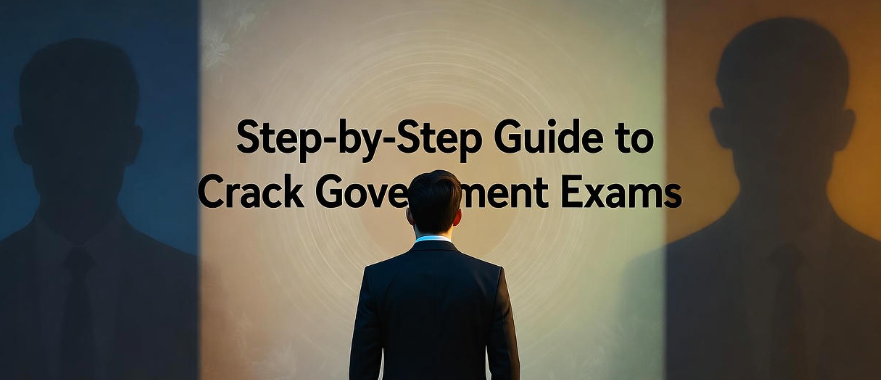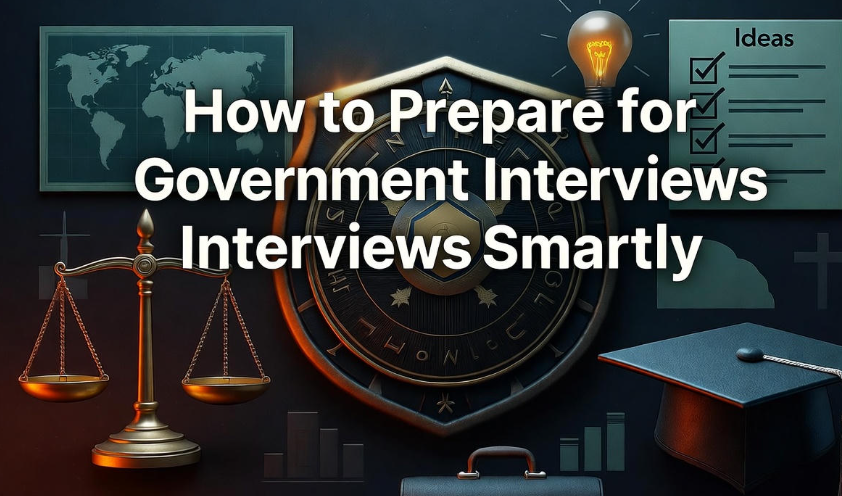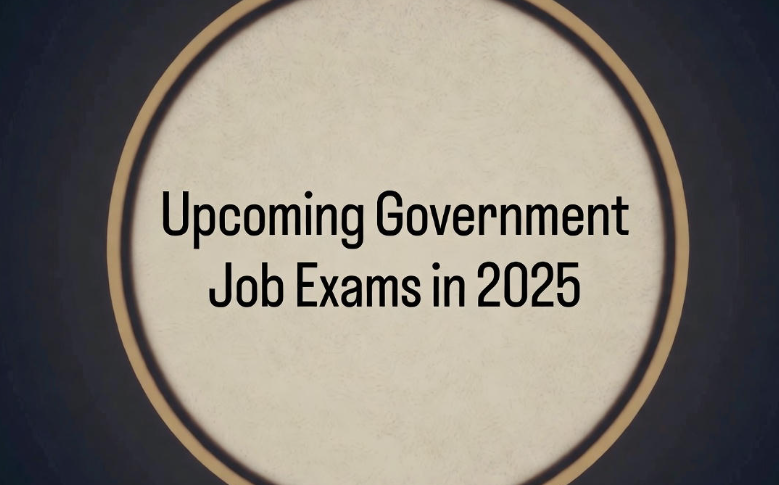Preparing for a government exam can sometimes feel like standing at the base of a tall mountain ⛰️ — the goal is clear, but the climb looks long and uncertain. Yet, thousands of candidates manage to reach the top every year. How? They follow a structured, smart, and consistent approach.
If you’ve ever wondered how to start, what to study, or how to manage time effectively, this guide will walk you through every step in plain, simple words. Let’s begin your journey toward cracking your dream government job!
Understand the Exam You’re Aiming For
Before jumping into books and mock tests, take a deep breath and do one simple thing: research. Every exam has its own structure, syllabus, and selection process. Whether you’re preparing for SSC, UPSC, Banking, Railway, or State PSC exams — understanding the pattern is your first win.
-
Check the official notification carefully.
-
Note down exam stages (like Prelims, Mains, Interview, or Skill Test).
-
Study the syllabus and mark important topics.
-
Go through previous year papers — they tell you exactly what to expect.
🧠 Tip: Create a small “Exam Profile Sheet” where you write all details (subjects, marks, negative marking, etc.) in one place. You’ll thank yourself later.
| Exam Type | Stages | Duration | Negative Marking |
|---|---|---|---|
| SSC CGL | Tier 1, Tier 2 | 1 hr each | Yes |
| UPSC | Prelims, Mains, Interview | Varies | Yes |
| Bank PO | Prelims, Mains, Interview | 1 hr – 3 hrs | Yes |
| Railway | CBT 1, CBT 2 | 90 mins each | Yes |
Build a Realistic Study Plan
A lot of candidates start strong but lose consistency after a few weeks. The secret? A realistic study plan. Don’t try to study 12 hours a day if you can’t maintain it. Start small, build the habit, and then grow.
Here’s what you can do:
-
Set daily targets, not impossible goals.
-
Divide your subjects — for example: Morning for Quantitative Aptitude, Afternoon for Reasoning, Evening for GK/Current Affairs.
-
Keep Sundays for revision and mock tests.
🗓️ Try this sample plan:
| Day | Subject | Duration | Task |
|---|---|---|---|
| Monday | Quant | 2 hrs | Practice previous year questions |
| Tuesday | Reasoning | 1.5 hrs | Solve puzzles |
| Wednesday | English | 2 hrs | Read newspaper + grammar |
| Thursday | GK | 2 hrs | Revise static GK |
| Friday | Current Affairs | 1 hr | Make short notes |
| Saturday | Mock Test | 2 hrs | Analyze mistakes |
| Sunday | Revision | 3 hrs | Revisit weak topics |
Remember: It’s not about how long you study, it’s about how smartly you study.
Master the Basics First
Before you try to solve tough questions or tricky reasoning puzzles, ensure your basics are strong. Especially in subjects like Quant and English, a weak foundation can hold you back.
📘 Focus on:
-
Mathematics: Learn formulas and shortcuts. Understand concepts, don’t just memorize.
-
English: Read daily. Improve vocabulary through newspapers, novels, or even YouTube subtitles!
-
Reasoning: Practice pattern recognition; it’s like training your brain muscles.
-
General Awareness: Read one reliable news source regularly. Don’t jump between too many.
It’s okay if you’re slow at first — what matters is daily improvement. Even one percent progress every day adds up quickly. 🚀
Use the Right Study Material
With thousands of books available, it’s easy to feel lost. But here’s a simple trick: stick to limited, trusted sources. Don’t buy every book you see online.
Some reliable ones:
-
Quantitative Aptitude by R.S. Aggarwal
-
A Modern Approach to Verbal & Non-Verbal Reasoning by R.S. Aggarwal
-
Word Power Made Easy by Norman Lewis (for vocabulary)
-
Lucent’s GK (for static knowledge)
-
Previous Year Papers (most underrated but powerful tool)
💡 Pro Tip: Create your own short notes for revision — handwritten notes help your brain remember faster.
Practice, Practice, and More Practice
You can’t clear government exams by only reading theory. You must practice regularly.
Here’s how to make it more effective:
-
Solve mock tests weekly to understand the exam environment.
-
Do time-bound practice — use a stopwatch or timer.
-
After each mock, analyze your mistakes. This step is more important than the test itself.
🧩 Example:
If you consistently lose marks in “Data Interpretation,” note it down and practice 10–15 questions daily from that topic for a week. Small corrections make a big difference over time.
Keep Revision at the Center
Most students read everything but forget to revise. That’s where they lose marks. Don’t repeat that mistake!
Use a simple 3-step revision cycle:
-
First revision: Within 48 hours of learning something.
-
Second revision: After 7 days.
-
Third revision: Just before the exam.
🧠 Tip: Keep short notes, flashcards, or summary sheets. They save time and refresh memory quickly.
Work on Time Management
During the actual exam, every second matters ⏱️. Even if you know the answers, poor time management can ruin your attempt.
Try these small strategies:
-
Attempt your strongest section first.
-
Don’t get stuck on one question — move on and come back later.
-
Keep the last 5 minutes for reviewing marked questions.
Practice this technique during mock tests so that it feels natural in the real exam.

Stay Updated with Current Affairs
For most exams, current affairs carry good weight. But you don’t need to memorize everything under the sun!
Focus on:
-
National and international events (last 6 months at least).
-
Government schemes and policies.
-
Awards, sports, and important appointments.
-
Economic news and reports.
Use apps like GK Today or read daily summaries. You can also make a simple chart to revise current affairs weekly. 📅
Stay Healthy and Positive
Mental and physical health play a huge role in exam success. Long hours of study can make you tired or anxious. That’s normal — but manageable.
-
Take short breaks after every hour.
-
Do light exercise or meditation daily.
-
Avoid comparing your progress with others.
-
Sleep properly — 6–7 hours minimum.
Remember, your goal is not just to pass, but to stay consistent till you achieve your dream. 🌟
Believe in Yourself
This might sound like a cliché, but it’s the most powerful step. Many people give up too early, not because they can’t do it, but because they stop believing they can.
Each mock test, each failed attempt, each bad day — they’re all part of your preparation story. Keep your motivation high, visualize success, and keep moving.
💪 You’re closer to your goal than you think.
Quick Recap Table
| Step | Action | Result |
|---|---|---|
| 1 | Understand the exam | Clear direction |
| 2 | Create a plan | Consistency |
| 3 | Strengthen basics | Strong foundation |
| 4 | Use right books | Better learning |
| 5 | Practice mocks | Exam readiness |
| 6 | Revise often | Retain knowledge |
| 7 | Manage time | Better attempt |
| 8 | Stay updated | Higher GK score |
| 9 | Stay healthy | Focused mind |
| 10 | Believe in yourself | Long-term success |
FAQs (Frequently Asked Questions)
Q1: How many hours should I study daily to crack a government exam?
There’s no fixed rule. Quality matters more than quantity. Aim for 4–6 focused hours daily, and gradually increase if needed.
Q2: How many months are enough for preparation?
Generally, 6–12 months of consistent preparation is sufficient, depending on the exam level and your starting point.
Q3: Should I join a coaching institute?
It’s optional. Many toppers clear exams through self-study using online resources. Coaching can help with structure but isn’t mandatory.
Q4: How to stay motivated during long preparation?
Set small goals. Reward yourself for achievements. Talk to positive people. And always remember why you started.
Q5: What’s the best way to prepare current affairs?
Use one reliable monthly magazine or app and make short weekly notes. Don’t overload yourself with multiple sources.
Final Thoughts
Cracking a government exam isn’t about being a genius — it’s about being consistent, strategic, and patient. Every day you study, you’re getting one step closer to your dream job.
So, keep your head up, your goals clear, and your heart confident ❤️. You’ve got this!





